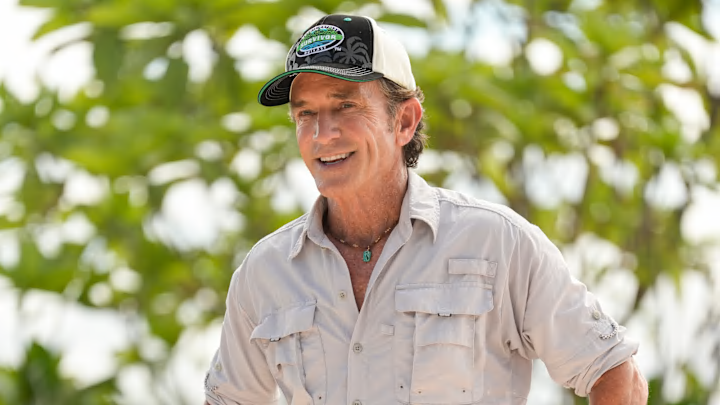On Survivor 47 episode 10, "Loyal to the Soil," host Jeff Probst made a surprising decision during the immunity challenge.
Players negotiated to trade their Shot in the Dark cubes for a bag of rice, and Probst accepted their offer. This rare deal left many fans wondering why he agreed. Probst has been historically a tough negotiator. He addressed the decision on the On Fire with Jeff Probst podcast, giving fans a behind-the-scenes look at his thought process.
The negotiation that changed Survivor 47
During the immunity challenge, Probst offered a large bag of rice if four players sat out. The tribe, desperate for food, countered with various proposals, including fewer sit-outs and sacrificing some Shot in the Dark cubes. Probst rejected those offers.
Then, Kyle Ostwald made a bold suggestion: the entire tribe would give up their Shot in the Dark cubes in exchange for rice.
After some hesitation, Sam Phalen, the final holdout, was convinced by Gabe Ortis to join the deal. He stated that his decision was because he was not going to be the person to deny the tribe food. It was probably the right decision as he would have become a bigger target if he stood his ground.
Probst, recognizing the creativity and sacrifice, accepted.
On his podcast, Probst explained how he navigated this real-time decision. “The offer to sacrifice all their Shots in the Dark for rice played out in real time,” Probst said. “My decision was happening just as fast.”
Probst revealed he had to consider multiple factors:
- Would this deal disrupt the game’s balance?
- Was giving up their Shot in the Dark cubes a genuine sacrifice?
- Did the moment add to the narrative of the season?
He also weighed the emotional element: “These are real people. They’re busting their butts out here. They came up with an inventive idea.”
Losing a key game element
The Shot in the Dark is designed to create uncertainty at Tribal Council. Without it, predictable tribal councils lose their element of surprise, which could dull some of the game’s excitement.
Probst acknowledged this challenge, saying, “You’re losing that dramatic element at Tribal, which creates a lot of uncertainty.” However, he ultimately decided the tribe’s sacrifice outweighed the potential loss of drama.
Probst added, “I felt it was a very strong offer. Someone will likely regret giving up their Hail Mary at some point.”
Probst emphasized how each season brings new dynamics. “Every season is unique for the players,” he said. “And it’s also unique for me.” This deal, he noted, was unprecedented, showing the creativity and adaptability of the Survivor 47 cast.
Kyle Ostwald’s suggestion, Gabe Ortis’s persuasive argument, and Sam Phalen’s ultimate agreement showcased the strategic thinking that defines Survivor. The moment also highlighted the tribe’s growing hunger, both for food and control of the game.
The fallout from the deal
Trading their Shot in the Dark cubes may have unified the tribe in the short term, but it raised new strategic questions. Without the safety net of the Shot in the Dark, players are now fully exposed at Tribal Council. This could lead to more cautious gameplay or force bold moves to secure alliances.
For Gabe Ortis, convincing Sam to agree was a strategic highlight. Unfortunately, Gabe himself was later voted out. Probst’s decision to accept the deal might have indirectly sealed Gabe’s fate, as it shifted the game’s focus to more direct and calculated voting strategies. However, it was unlikely that Gabe would have played it even if he had kept his cube.
What it means for future players
Probst left a clear message for future Survivor contestants: “History is merely an indicator of what has happened, not a predictor of what might happen.” This implies that while players can learn from past seasons, no two games will play out the same way. It could also mean that he might not accept such a deal in the future.
The rice-for-cubes deal may stand as one of Survivor’s boldest moments, reminding fans and players alike that adaptability is key. For Probst, the deal exemplified the creativity and ingenuity that make Survivor a constantly evolving game.
The tribe’s decision to trade their Shot in the Dark cubes for rice was bold, creative, and risky. Jeff Probst’s willingness to accept their offer showcased his ability to adapt and enhance the game’s narrative. While the move changed the dynamics of Survivor 47, it also reminded us why the show remains a staple of reality TV: it’s unpredictable, inventive, and driven by its players.
As fans wait to see how this decision impacts the remaining episodes, one thing is clear—this season will go down in history as one of the most innovative yet.
